A recession-resistant business is one which has little to no drop in revenue during recessions. Here are 15 recession-resistant business ideas for people who want to start their own company.
1. Crematorium
Recessions don’t reduce death rates. That means demand for death care services is recession-resistant. However, not all death care business models are equally good opportunities. Cemeteries and traditional burial-focused funeral homes have been losing market share almost every year for the past several decades. On the other hand, cremation has been growing in market share for those same decades.

If I started a crematorium today, I would simultaneously pursue three methods of getting customers:
- I would build a business TikTok account with a mix of educational and emotional/uplifting content about how to deal with the death of a family member. I would have a link in the TikTok bio to my website where people could purchase cremation services (including body pickup and direct-to-your-door delivery of ashes).
- I would reach out to all nursing homes and hospitals within a certain radius of my crematorium facility and attempt to establish partnerships (possibly with paid referrals) where they would recommend my crematorium to families who lost someone.
- I would reach out to all funeral homes within a certain radius of my crematorium and offer my services to them if they didn’t have an in-house crematorium.
If you want to go the extra mile in your business, there is a newer and lesser known type of cremation known as “aquamation” which you could offer in place of or in addition to traditional cremation. Check out this article for a discussion of the economics, cultural trends, and laws related to aquamation.
2. Online urn seller
Whether its the ashes produced by traditional cremations or the bone powder produced by aquamations, demand for urns is growing at the same rate as demand for cremations and is just as recession-resistant. In fact, demand for some types of “alternative” urns such as necklace urns has grown even faster.
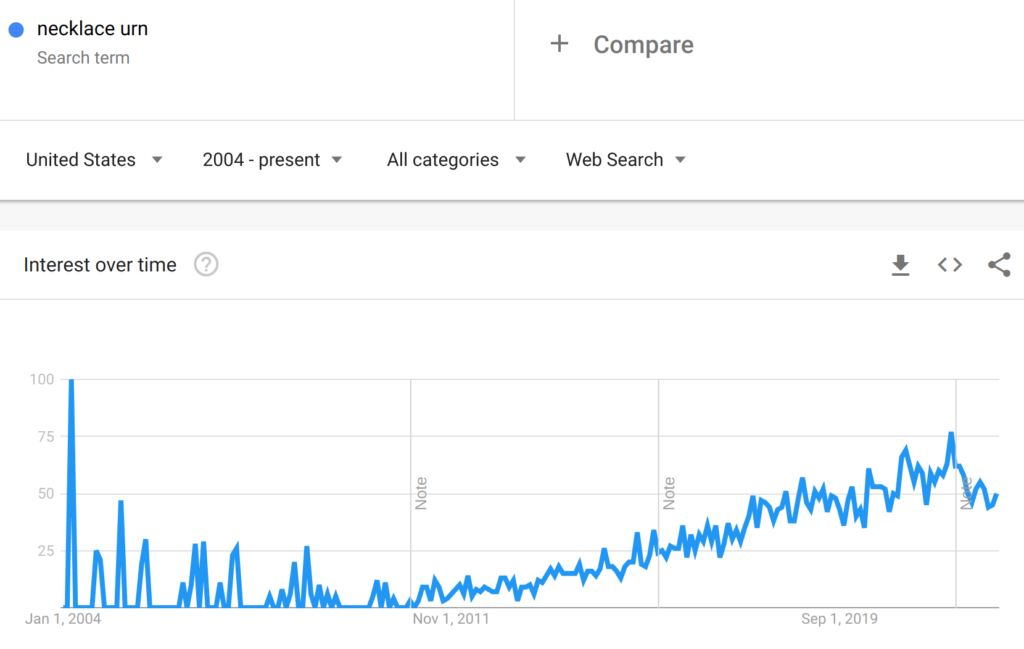
Over the past 10 years, google search interest for “cremations” has roughly tripled while search interest for “necklace urns” has increased roughly 5x. If I were going to start an urn business today, I would focus on urn necklaces before branching into more traditional urns as well. As with the crematorium business, I would focus my marketing efforts on TikTok (organic and paid ads). I might also try Facebook paid ads.
As for the urns themselves, you could start with dropshipping, although I think you’d likely have more luck going organically viral on TikTok if you make (or at least customize) the urn necklaces yourself. TikTokers love “behind the scenes” type content from small businesses that show how their products are being made.
3. Candy company
Candy is cheap and comforting. That means when people get stressed out (e.g. from a recession), they don’t really pull back on candy consumption. If we look at the graph of net sales from the company that makes tootsie rolls, we can see that sales didn’t really drop after either the dot com bubble or the great recession.
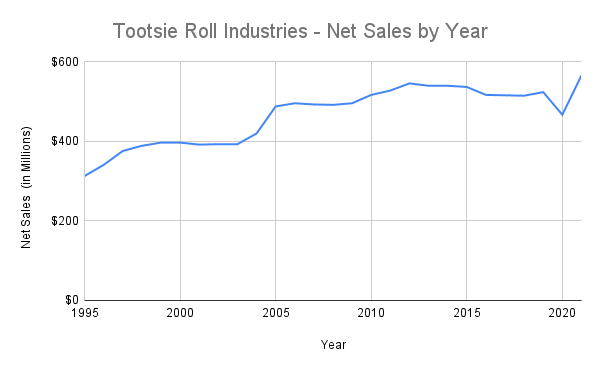
If we look at net sales from the Hershey Company, we see an even more pronounced disregard for recessions.
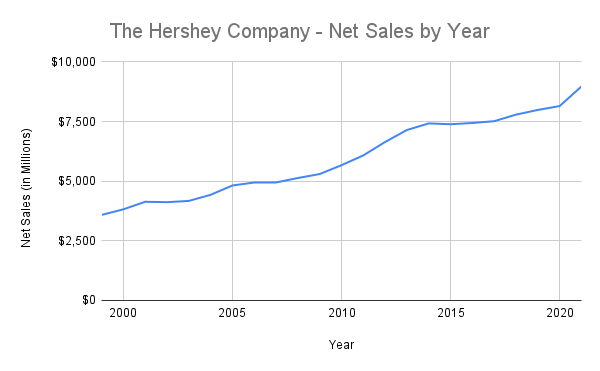
The idea then is to create a new candy (ideally chocolate since it has mildly addictive properties) brand. You can probably guess how I would launch this new brand: TikTok. There has already been one viral candy video that launched a brand of supposedly aphrodisiac chocolates.
4. Alcoholic beverage brand
Like candy and chocolate, alcohol consumption does not decrease during times when people are more stressed out. You can clearly see this in the chart below of total u.s. retail sales of beer, wine, and liquor stores.
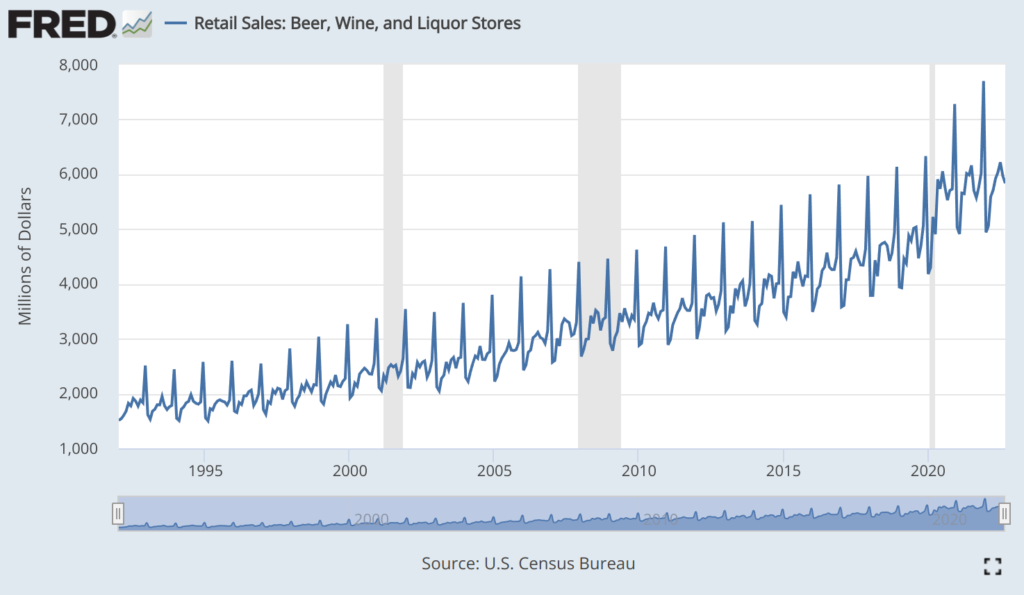
The opportunity then is to create a new branded alcoholic beverage like the Rock’s Teremana Tequila, Ryan Reynolds’ Aviation Gin, or Conor McGregor’s “Proper No. Twelve Irish Whiskey”. This strategy is ideal if you are already a beloved celebrity. If you aren’t, you’ll have to be much more creative with your marketing and distribution strategies.
5. HVAC contractor
If you live in a sunbelt state like Florida or Texas, you know that you’d pay anything an AC repairman asks when your air conditioning stops working in August. Living in humid 90 degree weather is utterly miserable, which means the demand for AC repairs is very inelastic. Recession or no recession, people will pay for air conditioning. That means an HVAC contracting business in a place like Boca Raton, Fort Lauderdale, Tampa, Houston, or Austin is an extremely recession-resistant business (especially if you focus on repairs and replacements rather than new home installations).
Bonus Tip: If you are a copywriter or marketer living in south Florida and don’t want to run an HVAC business yourself, consider focusing your existing marketing business on acquiring HVAC contractors as customers. Since they are recession-resistant, you will be too if they are the majority of your customers. That strategy is actually way more general than just marketing and copywriting. You could offer any product or service to any recession-resistant business, and the result will be a recession-resistant business. For example, you could offer bookkeeping for crematoriums, marketing services for alcohol brands, etc.
This strategy isn’t perfect. If you are a digital marketer who serves HVAC contractors and then a recession hits, other digital marketers who used to serve real estate brokers may switch to focusing on the HVAC contractors who still have business, and that increased competition may force down your margins and profits. However, you’ll still be far better off as the marketer who was already serving HVAC contractors than the one who had to switch from serving brokers to contractors.
6. Subscription dog-walking service
People don’t spend any less money on pets during recessions. You can clearly see this resilience in the aftermath of the dot com bubble, during the financial crisis, and during covid in the chart below.
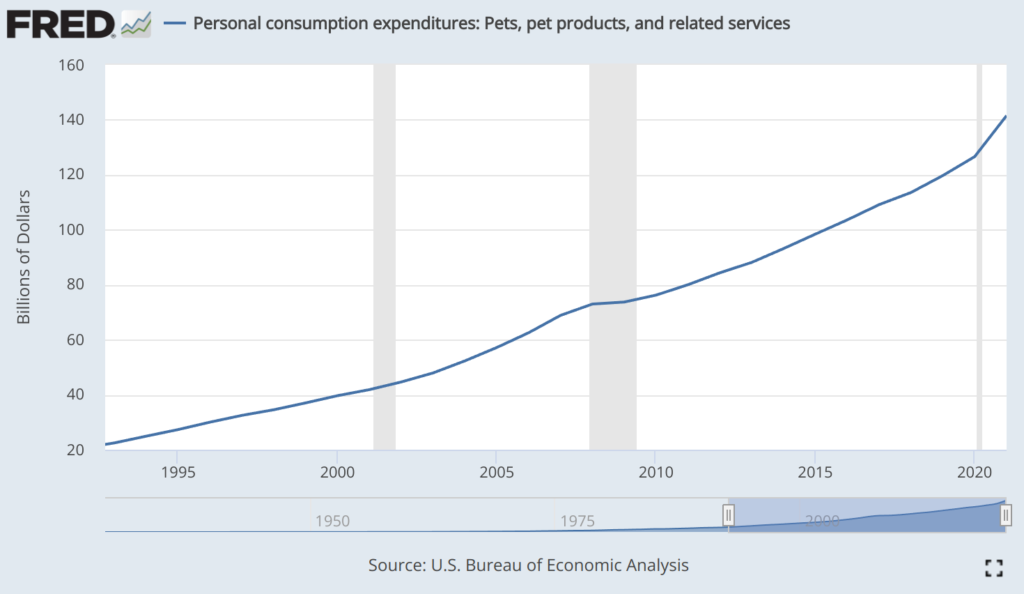
That means businesses that sell products or services for pets should see little to no detrimental effects from a recession. One of the easiest types of pet businesses to start is a dog walking business. You can start off walking the dogs yourself, and little to no money is needed to get started. You can go knocking door to door around your local area to find initial customers, or you can spend $50 and leave nice business cards at all the houses. You can also use Rover to find dog walking customers.
As a variation on the traditional dog walking business, I would try selling subscriptions to walk a dog every weekday with payment upfront for each month. That makes the revenue more predictable and also gives you some extra time value of money.
As you grow your set of customers, you can start hiring additional dog walkers. I would try to get to a point where I can assign three dog walkers to each customer. Why three? Because three is both few enough that the customer can be comfortable and familiar with each one, yet also a large enough number to reasonably ensure that at least one of them is always available (which is critical for the subscription model to work and is one of the main value propositions for why someone would opt to pay for a subscription over a one-off, as-needed dog walking business model).
7. Aquamation for pets
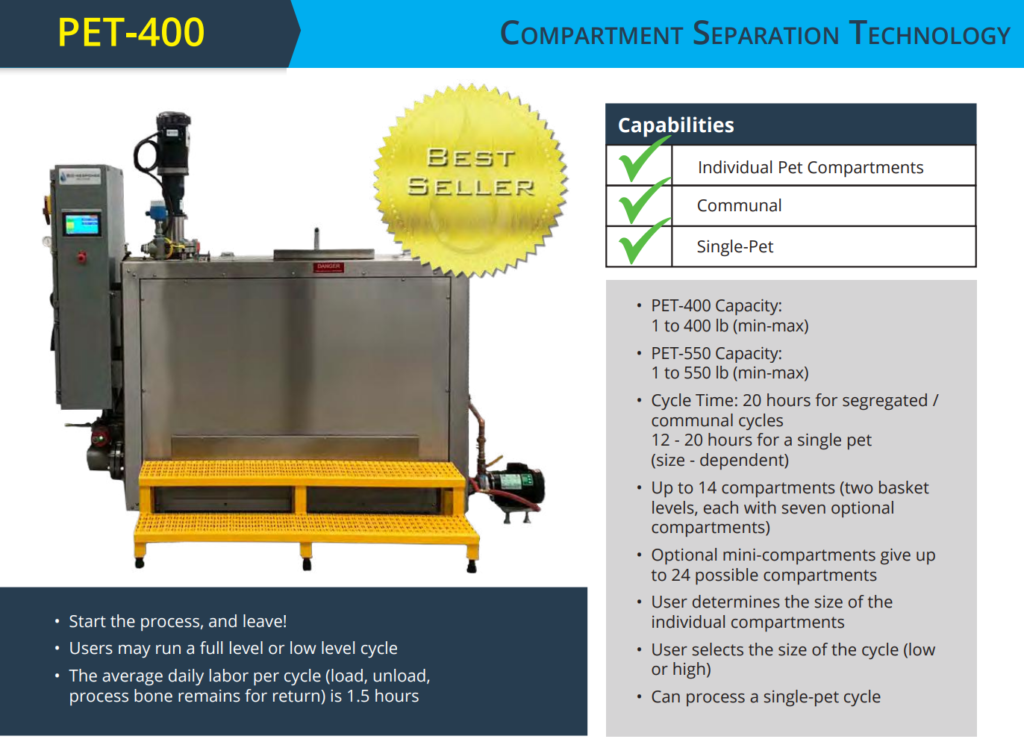
Pets are becoming more common, and unfortunately that also means pet death is becoming more common. How do you dispose of a dead pet? Well, one way is through aquamation. The money needed to start a pet aquamation business is much less than the money needed to start a human aquamation business, and the regulations are less stringent also.
To get customers, you could use TikTok and Google SEO with blog articles that answer questions about dead or dying pets.
You could even enhance your revenue further by also selling neckace and other urns for pet ashes.
8. Dog resort
Airbnb sounded like a crazy idea when it was founded, but then it took off. After a few years, it evolved from people just renting out their spare bedroom to people buying and building entire properties just to rent out on Airbnb.
Rover is sort of like Airbnb for dogs. Anyone can sign up as a pet sitter to take care of dogs or cats in their home for a nightly rate. I use Rover every time I travel because I feel like my dog will have a better experience than they would in a kennel, and I pay a premium for that ($50/night). However, the “professionals” haven’t yet come to Rover in the same way they have to Airbnb which means there is an opportunity to be an early mover. Build a custom property with multiple “private rooms” for dogs.
These rooms don’t need running water or plumbing which makes them much cheaper to build than a house or apartment unit. Build 5-10 units on one property and then host dogs for $50/night, each with their own private room. You can take each of them out to play for a period of time, and of course you need to walk them. Eventually, you could hire staff to run the resort. The profit margins of this business have the potential to be much higher than Airbnb margins, and this business also taps into the recession-resistant pet industry money.
9. Pet dental treats
As yet another way to tap into the recession resistant pet industry, you could manufacture healthy dental treats for dogs, cats, hamsters, or other pets. There are existing competitors in this space, but if you are good at marketing (e.g. through TikTok) you could make this work. This type of business is also great because if you design the treats for daily (or nightly) use, the revenue should be recurring. In fact, you could even sell subscriptions where you send pet owners a set of 30 treats every month or 90 treats every 3 months.
10. Natural, green dog shampoo
This is another pet industry marketing play. Create a natural, environmentally-friendly, and healthy dog shampoo. Since there are competitors, the way to make this work is through great marketing.
11. Doctor’s office
People pay for healthcare whether the economy is good or bad. Part of the reason why is that people need to be healthy enough to work regardless of the economy. Another part of the reason is that much of healthcare is actually paid for by insurance companies or the government. But regardless of reason, just look at the chart below which shows health expenditures in the U.S. by year. Note how recessions appear to have zero impact on the growth rate of spending.
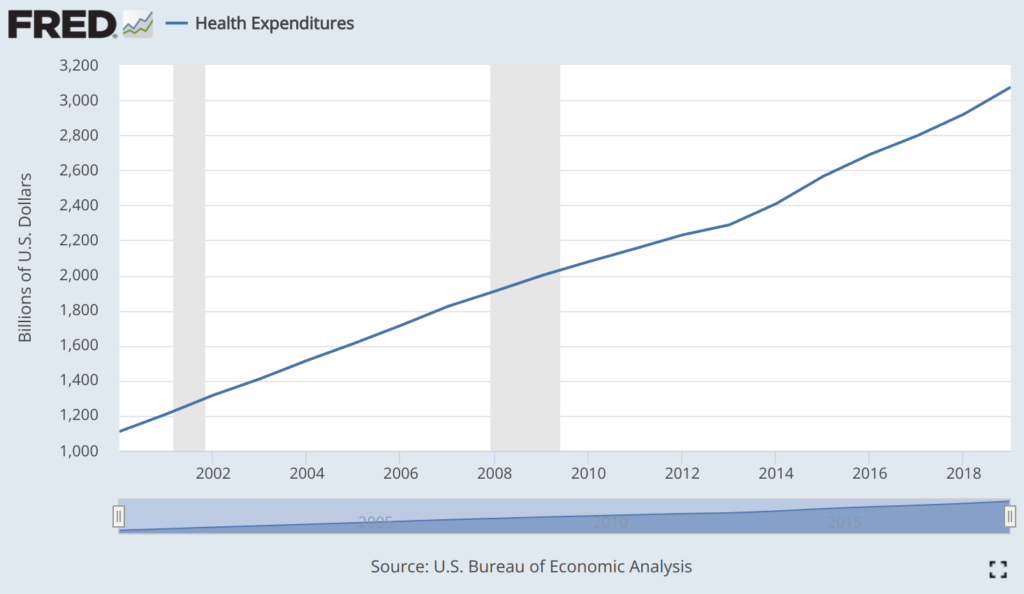
That recession resistance means that doctor offices are very recession-resistant businesses. If I were a doctor with my own practice right now, I would also take advantage of TikTok for marketing. There are a few doctors on TikTok who have been very successful in going viral and driving traffic to their websites, but the space still is very new, and there is plenty of opportunity for doctors to market their services via TikTok.
12. Phone automation for doctors’ offices
We just established that doctor’s offices are recession resistant businesses. That means a non-commodity business that sells primarily to doctor’s offices will also be recession resistant. For example, sticky saas (software-as-a-service) products built for doctors’ offices would be very recession resistant. A great example of a sticky saas product for a doctor’s office is phone automation software.
You know how when you call a doctor, you are routed through a maze of automated “press 1 if you are new patient who is looking to schedule an appointment, press 2 if you are an established patient with an upcoming appointment, press 3 if you have a pimple in armpit,” etc?
We’ve all experienced those frustrating mazes, so help doctors do better. Make a visual-audio hybrid interface that allows users to more quickly navigate the maze, use AI to cut down on the number of steps required to navigate the maze, or use any other strategy to make the phone system less annoying to doctors’ customers. Doctors have lost my business before because I lost patience with the phone system, and that’s not unique to me. Doctors’ offices lose patients and money from bad phone automation systems. Make a better solution.
NOTE: South Florida is a great market to build a product like this since it is a fast-growing area where demand is outstripping the supply of doctors, and since there are lots of retirees (with lots of health problems) moving in each year in need of a new doctor.
NOTE 2: You could also build a phone automation system for pharmacies like CVS.
13. Transparent physician billing
When you go to the doctor, you often don’t know how much your bill will be until after services have already been rendered. There are many reasons for that (e.g. legal requirements for doctors to treat some types of patients without regard to whether or not they can pay, doctors outsourcing the business management and billing to other companies who then negotiate with insurance companies after the fact, legal and ethical issues around which situations are emergent and therefore which situations the patient should be given a choice of treatment, etc).
These are big problems, and there is no simple solution. However, if you could solve even a small piece of the problem for specific patients in specific situations, you might have a billion dollar finance or fintech business. Transparent billing that helps patients be able to shop prices and make price-informed decisions about service providers and services rendered is a massive opportunity for anyone with the guts and wits to tackle it.
14. Hospital cybersecurity services
Cybersecurity is a sticky product. That means as long as the customers you target don’t go out of business, they will probably keep paying. Hospitals (and especially non-profit hospitals) likely will continue to do just fine during a recession. That means you should also be able to continue selling cybersecurity to them during a recession.
Last year, a security breach of CommonSpirit Health (the second-largest nonprofit U.S. hospital chain) affected facilities in at least 4 states. This is just one example of the growing cyber threat to healthcare organizations. Help these organizations mitigate that threat.
15. Government software development contractor
A software development agency builds custom software for clients. You might be building databases, mobile apps, websites, ML models, dashboards, or some other type of software system. Mobile apps and websites are the easiest place to start since there are lots of small businesses willing to pay thousands or tens of thousands of dollars to have a website or app built for them. They may also pay you hundreds or thousands of dollars each month just to maintain the website or app as well. That’s a great business.
However, things get even better when you consider government contracting. The federal government, all 50 state governments, all 3000+ county governments, and even city governments hire contractors for all sorts of work from landscaping to catering to software development. At the federal level, there are even legal requirements for the government to give a certain amount of contract money to small businesses so you don’t have to compete with Microsoft.
If you have had at least 1 small business client for software development, then you can probably also get a government contract if you are willing to put in the time and paperwork. The payoff for that time and paperwork is a VERY stable source of income (a government contract).
The federal and state governments are the most recession-resistant customers you could ever hope for. They will continue to pay you no matter what the economy is doing. You can find current and upcoming federal contracts on sam.gov (and each state and local government will have their own similar system for finding contract opportunities).